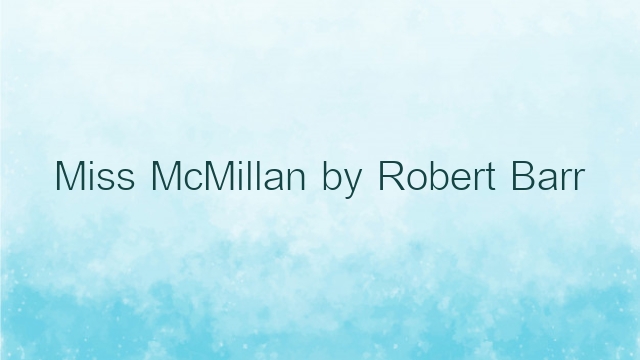
Miss McMillan by Robert Barr
“Come hop, come skip, fair children all,
Old Father Time is in the hall.
He’ll take you on his knee, and stroke
Your golden hair to silver bright,
Your rosy cheeks to wrinkles white”
In the saloon of the fine Transatlantic liner the Climatus, two long tables extend from the piano at one end to the bookcase at the other end of the ample dining-room.
On each side of this main saloon are four small tables intended to accommodate six or seven persons. At one of these tables sat a pleasant party of four ladies and three gentlemen. Three ladies were from Detroit, and one from Kent, in England. At the head of the table sat Mr. Blair, the frosts of many American winters in his hair and beard, while the lines of care in his ragged, cheerful Scottish face told of a life of business crowned with generous success.
Mr. Waters, a younger merchant, had all the alert vivacity of the pushing American. He had the distinguished honour of sitting opposite me at the small table. Blair and Waters occupied the same room, No. 27. The one had crossed the Atlantic more than fifty times, the other nearly thirty. Those figures show the relative proportion of their business experience.
The presence of Mr. Blair gave to our table a sort of patriarchal dignity that we all appreciated. If a louder burst of laughter than usual came from where we sat and the other passengers looked inquiringly our way the sedate and self-possessed face of Mr. Blair kept us in countenance, and we, who had given way to undue levity, felt ourselves enshrouded by an atmosphere of genial seriousness. This prevented our table from getting the reputation of being funny or frivolous.
Some remark that Blair made brought forth the following extraordinary statement from Waters, who told it with the air of a man exposing the pretensions of a whited sepulchre.
“Now, before this voyage goes any further,” he began, “I have a serious duty to perform which I can shirk no longer, unpleasant though it be. Mr. Blair and myself occupy the same state-room. Into that state-room has been sent a most lovely basket of flowers. It is not an ordinary basket of flowers, I assure you, ladies. There is a beautiful floral arch over a bed of colour, and I believe there is some tender sentiment connected with the display;–‘Bon Voyage,’ ‘Auf Wiedersehen,’ or some such motto marked out in red buds. Now those flowers are not for me. I think, therefore, that Mr. Blair owes it to this company, which has so unanimously placed him at the head of the table, to explain how it comes that an elderly gentleman gets such a handsome floral tribute sent him from some unknown person in New York.”
We all looked at Mr. Blair, who gazed with imperturbability at Waters.
“If you had all crossed with Waters as often as I have you would know that he is subject to attacks like that. He means well, but occasionally he gives way in the deplorable manner you have just witnessed. Now all there is of it consists in this–a basket of flowers has been sent (no doubt by mistake) to our state-room. There is nothing but a card on it which says ‘Room 27.’ Steward,” he cried, “would you go to room 27, bring that basket of flowers, and set it on this table. We may as well all have the benefit of them.”
The steward soon returned with a large and lovely basket of flowers, which he set on the table, shoving the caster and other things aside to make room for it.
We all admired it very much, and the handsome young lady on my left asked Mr. Blair’s permission to take one of the roses for her own. “Now, mind you,” said Blair, “I cannot grant a flower from the basket, for you see it is as much the property of Waters as of myself, for all of his virtuous indignation. It was sent to the room, and he is one of the occupants. The flowers have evidently been misdirected.”
The lady referred to took it upon herself to purloin the flower she wanted. As she did so a card came in view with the words written in a masculine hand–
To Miss McMillan, With the loving regards of Edwin J—-
“Miss McMillan!” cried the lady; “I wonder if she is on board? I’d give anything to know.”
“We’ll have a glance at the passenger list,” said Waters.
Down among the M’s on the long list of cabin passengers appeared the name “Miss McMillan.”
“Now,” said I, “it seems to me that the duty devolves on both Blair and Waters to spare no pains in delicately returning those flowers to their proper owner. I think that both have been very remiss in not doing so long ago. They should apologise publicly to the young lady for having deprived her of the offering for a day and a half, and then I think they owe an apology to this table for the mere pretence that any sane person in New York or elsewhere would go to the trouble of sending either of them a single flower.”
“There will be no apology from me,” said Waters. “If I do not receive the thanks of Miss McMillan, it will be because good deeds are rarely recognised in this world. I think it must be evident, even to the limited intelligence of my journalistic friend across the table, that Mr. Blair intended to keep those flowers in his state-room, and–of course I make no direct charges–the concealment of that card certainly looks bad. It may have been concealed by the sender of the flowers, but to me it looks bad.”
“Of course,” said Blair dryly, “to you it looks bad. To the pure, etc.”
“Now,” said the sentimental lady on my left, “while you gentlemen are wasting the time in useless talk the lady is without her roses. There is one thing that you all seem to miss. It is not the mere value of the bouquet. There is a subtle perfume about an offering like this more delicate than that which Nature gave the flowers–“
“Hear, hear,” broke in Waters.
“I told you,” said Blair aside, “the kind of fellow Waters is. He thinks nothing of interrupting a lady.”
“Order, both of you!” I cried, rapping on the table; “the lady from England has the floor.”
“What I was going to say–“
“When Waters interrupted you.”
“When Mr. Waters interrupted me I was going to say that there seems to me a romantic tinge to this incident that you old married men cannot be expected to appreciate.”
I looked with surprise at Waters, while he sank back in his seat with the resigned air of a man in the hands of his enemies. We had both been carefully concealing the fact that we were married men, and the blunt announcement of the lady was a painful shock. Waters gave a side nod at Blair, as much as to say, “He’s given it away.” I looked reproachfully at my old friend at the head of the table, but he seemed to be absorbed in what our sentimental lady was saying.
“It is this,” she continued. “Here is a young lady. Her lover sends her a basket. There may be some hidden meaning that she alone will understand in the very flowers chosen, or in the arrangement of them. The flowers, let us suppose, never reach their destination. The message is unspoken, or, rather, spoken, but unheard. The young lady grieves at the apparent neglect, and then, in her pride, resents it. She does not write, and he knows not why. The mistake may be discovered too late, and all because a basket of flowers has been missent.”
“Now, Blair,” said Waters, “if anything can make you do the square thing surely that appeal will.”
“I shall not so far forget what is due to myself and to the dignity of this table as to reply to our erratic friend. Here is what I propose to do–first catch our hare. Steward, can you find out for me at what table and at what seat Miss McMillan is?”
While the steward was gone on his errand Mr. Blair proceeded.
“I will become acquainted with her. McMillan is a good Scotch name and Blair is another. On that as a basis I think we can speedily form an acquaintance. I shall then in a casual manner ask her if she knows a young man by the name of Edwin J., and I shall tell you what effect the mention of the name has on her.”
“Now, as part owner in the flowers up to date, I protest against that. I insist that Miss McMillan be brought to this table, and that we all hear exactly what is said to her,” put in Mr. Waters.
Nevertheless we agreed that Mr. Blair’s proposal was a good one and the majority sanctioned it.
Meanwhile our sentimental lady had been looking among the crowd for the unconscious Miss McMillan.
“I think I have found her,” she whispered to me. “Do you see that handsome girl at the captain’s table. Really the handsomest girl on board.”
“I thought that distinction rested with our own table.”
“Now, please pay attention. Do you see how pensive she is, with her cheek resting on her hand? I am sure she is thinking of Edwin.”
“I wouldn’t bet on that,” I replied. “There is considerable motion just now, and indications of a storm. The pensiveness may have other causes.”
Here the steward returned and reported that Miss McMillan had not yet appeared at table, but had her meals taken to her room by the stewardess.
Blair called to the good-natured, portly stewardess of the Climatus, who at that moment was passing through the saloon.
“Is Miss McMillan ill?” he asked.
“No, not ill,” replied Mrs. Kay; “but she seems very much depressed at leaving home, and she has not left her room since we started.”
“There!” said our sentimental lady, triumphantly.
“I would like very much to see her,” said Mr. Blair; “I have some good news for her.”
“I will ask her to come out. It will do her good,” said the stewardess, as she went away.
In a few moments she appeared, and, following her, came an old woman, with white hair, and her eyes concealed by a pair of spectacles.
“Miss McMillan,” said the stewardess, “this is Mr. Blair, who wanted to speak to you.”
Although Mr. Blair was, as we all were, astonished to see our mythical young lady changed into a real old woman, he did not lose his equanimity, nor did his kindly face show any surprise, but he evidently forgot the part he had intended to play.
“You will pardon me for troubling you, Miss McMillan,” he said, “but this basket of flowers was evidently intended for you, and was sent to my room by mistake.”
Miss McMillan did not look at the flowers, but gazed long at the card with the writing on it, and as she did so one tear and then another stole down the wrinkled face from behind the glasses.
“There is no mistake, is there?” asked Mr. Blair. “You know the writer.”
“There is no mistake–no mistake,” replied Miss McMillan in a low voice, “he is a very dear and kind friend.” Then, as if unable to trust herself further, she took the flowers and hurriedly said, “Thank you,” and left us.
“There,” I said to the lady on my left, “your romance turns out to be nothing after all.”
“No, sir,” she cried with emphasis; “the romance is there, and very much more of a romance than if Miss McMillan was a young and silly girl of twenty.”
Perhaps she was right.





